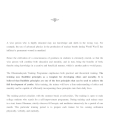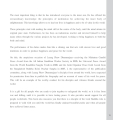moral principles : ค้นหาหนังสือธรรมะ
หน้าหนังสือทั้งหมด

45
The Importance of Moral Education in Teaching
Only with moral education can human beings eliminate conflicts, selfish and greedy tendencies and practices so that man may truly coexist with mindful and peaceful consideration for each other. This s
This text emphasizes the necessity of moral education to eliminate selfish and greedy tendencies, enabling peaceful coexistence. It discusses the role of various types of teachers—parents, school teac

30
The Essential Role of Teachers in Education
knowledge or science in a way that encourages absorption while correctly and
clearly conveying the subject matter to the pupil.
To be skilled in the art of teaching, teachers must not only deliver the
Teachers play a crucial role in shaping students by blending academic knowledge with moral guidance. A clear understanding of their responsibilities can empower teachers to produce not only intelligen

95
The Moral Responsibility of Individuals in Society
Suzanne Jeffrey
those individuals their moral responsibility to the society in which they live. If they don't practice moral economics, then people can't live together. The first time that the Buddha
This text discusses the moral obligations individuals face within their communities. It emphasizes the vital role of teachers as lifelong guides in moral development, contrasting with other temporary

134
The Role of Parents and Teachers in Moral Training
Suzanne Jeffrey
"The teachers have a double duty, one of moral training and the other of academic training. So how do we solve this problem of teaching children what is good and bad? We train the par
In this text, Suzanne Jeffrey emphasizes the dual responsibility of teachers in academic and moral training. It suggests that parents must also be involved in teaching good habits alongside teachers a

69
Success of Moral Training Projects: Dhammadayada Program
ASE HISTORY OF THE SUCCESS OF MORAL TRAINING PROJECTS
The Dnammadayada (Dhamma Inheritors) Training Programme has been conducted for twenty-seven years since the beginning of the Dhammikaya Foundatio
The Dhammadayada Training Programme has operated for twenty-seven years, focusing on hands-on Buddhist practice for students. In 1996, the program was scientifically assessed, revealing that participa

164
Understanding the Fruitful Elderly: A Guide to Altruism and Wisdom
The second type of elderly person is called “A Fruitful Person,” a philanthropist or altruist. Throughout their lives, these elderly people have diligently earned their livelihood, and are well prepar
The second type of elderly individual, termed 'A Fruitful Person', exemplifies philanthropy and self-sufficiency. These individuals have not only prepared well for their later years but have also enga

13
The Importance of Responsibility in Life
…, a person who has truthfulness is responsible in his/ her work, speech, choice of friends, and has moral principles. Thus, that person thinks, speaks, and acts with sincerity and good intentions so everything is don…
This text discusses the significance of responsibility in various aspects of life including work, speech, friendships, and adherence to moral standards. It emphasizes that true responsibility requires

84
The Core Principles of Buddhist Living
Purity of livelihood (achivaparissuddhismavara): The main duties of monks are to study Dhamma, practice meditation, and teach the Dharma knowledge to the public. The daily subsistence of monks comes f
This text outlines the essential duties and practices of Buddhist monks focusing on livelihood, moderation, and core principles of Buddhism. Monks dedicate themselves to studying Dhamma, meditating, a

14
Understanding Karma and Human Behavior
Introduction
of our actions having brought this suffering of disharmony into our lives and seek to address the causes that are creating and accumulating bad karma. And our accumulated karma designate
This text delves into the impact of our actions on accumulating karma and the subsequent effects on our lives and rebirth. It outlines the ten bodily conditions we face as we navigate life and the nec

156
Purification of the Mind: A Path to Enlightenment
3. Purify the mind: Keep one's mind bright and clear all the time, while inhaling and exhaling. If a person inhales and does not exhale, that person's life will come to an end. Death bears no sign of
This text emphasizes the importance of maintaining a clear and bright mind through inhalation and exhalation. It explains how a person's mental state can determine their spiritual fate in the afterlif

110
Ethical and Moral Development in Education
Metaphors with a Dharma Master
at home and what they are bringing into the classroom. And, how many bad habits can we actually fix? The teachers tend to blame the parents and the parents blame the te
This text discusses the critical role of ethical and moral development in education. It highlights the blame game between parents and teachers when children exhibit bad behavior, asserting that these

159
Truth for the Family: Essential Practices for Moral Living
Part Five: Truth for the Family
2. Moral Discipline (silamaya) - Observing moral
behavior by restraining our speech and actions to do
only good; not causing turmoil for others.
3. Meditation Practice
Part Five discusses vital practices for families to cultivate a moral lifestyle. It highlights the importance of moral discipline (silamaya), meditation (bhavanamaya), and humility (apacayanamaya) amo

131
Understanding the Six Directions in Education and Moral Development
Meeting #19
9AM - 20 March 2010
"Yesterday, I said to you that we would talk about the six directions. These, we cannot separate. They are, in fact, the same thing, only each direction has a differen
In this meeting, the focus is on the six directions, emphasizing their interconnected nature and the importance of harmonizing relationships in personal and national development. Education is portraye

7
The Writers and Thinkers for World Peace
The Writers and Thinkers for World Peace,
Moral Development Thru Education Foundation Paperback
First Edition 2004
Copyright © 2004 by the Writers and Thinkers for World Peace,
Moral Development Thru
This book, published in 2004 by the Writers and Thinkers for World Peace, explores the role of education in moral development and peace-building. Edited and translated by notable figures, it emphasize

80
Cultivating Goodness in Education
A wise person who is highly educated may use knowledge and skills in the wrong way. For example, the use of advanced physics in the production of nuclear bombs during World War II has inflicted a perm
This text emphasizes the importance of combining education with morality to promote the wise use of knowledge. It highlights the Dhammadayada Training Programme, which uses Buddhist principles to inst

164
Characteristics of Fruitful Elderly Individuals
The second type of elderly person is called "A Fruitful
Person," a philanthropist or altruist.
Throughout their lives, these elderly people have
diligently earned their livelihood, and are well prepar
The text discusses the qualities of 'Fruitful Persons,' elderly individuals who exemplify self-sufficiency and altruism. They live by Buddhist principles, offer alms, adhere to precepts, and meditate

13
The Inner Sun: A Path to Enlightenment
The most important thing is that he has introduced everyone to the inner sun. He has offered his extraordinary knowledge: the principles of meditation for achieving the inner body of enlightenment. Th
This text highlights Luang Phaw Dhammajayo's contributions to meditation and inner peace. He teaches principles that help individuals achieve enlightenment, leading to happiness and a positive impact

133
The Importance of True Friendship and Self-Reflection
for who we are: Not in the mirror, but inside of our mind. If we focus on the external,
then defilements cloud our mind. We will develop false friendships and these are people
around you who have not
In our lives, we encounter both true and false friends. False friends can lead us down destructive paths due to their selfishness, insincerity, and lack of principles. They can contribute to societal

156
Purifying the Mind for a Better Life
3. Purify the mind: Keep one's mind bright and clear
all the time, while inhaling and exhaling. If a person inhales
and does not exhale, that person's life will come to an end.
Death bears no sign of
This text discusses the significance of maintaining a clear and bright mind through inhalation and exhalation as key to life and decision-making. It emphasizes preparing for death by reflecting on pas

15
Understanding the Eternal Punishment of Life and the Role of Educators
In this prison there is punishment. It is not normal punishment like whipping or torture, which comes to an end; the punishment in this prison goes on forever and ever. Ageing, sickness, death and bir
This content discusses the perpetual punishment of existence, highlighting how suffering is inherent in our lives through age, sickness, and basic needs. It emphasizes the necessity for mindful teachi
